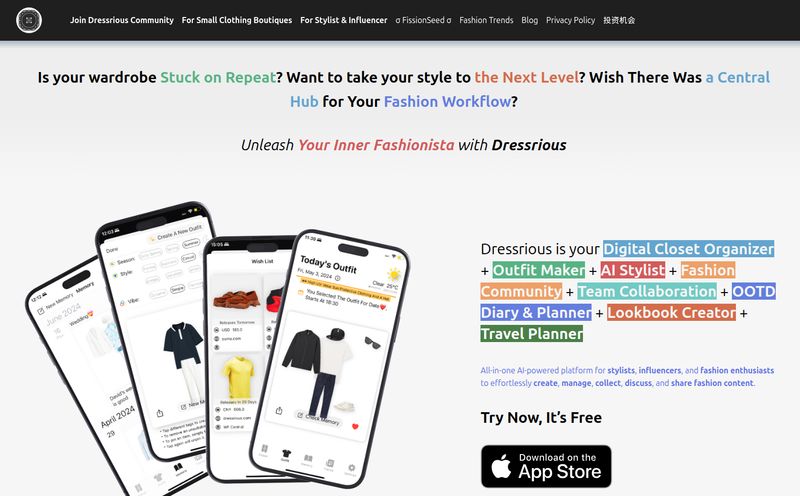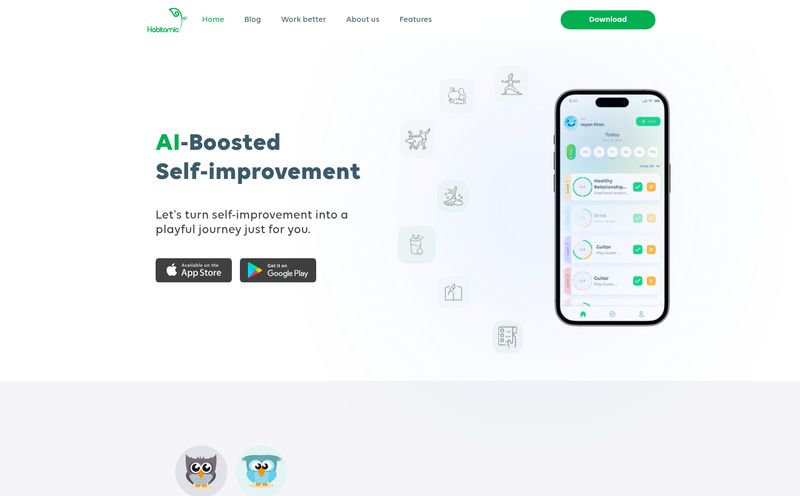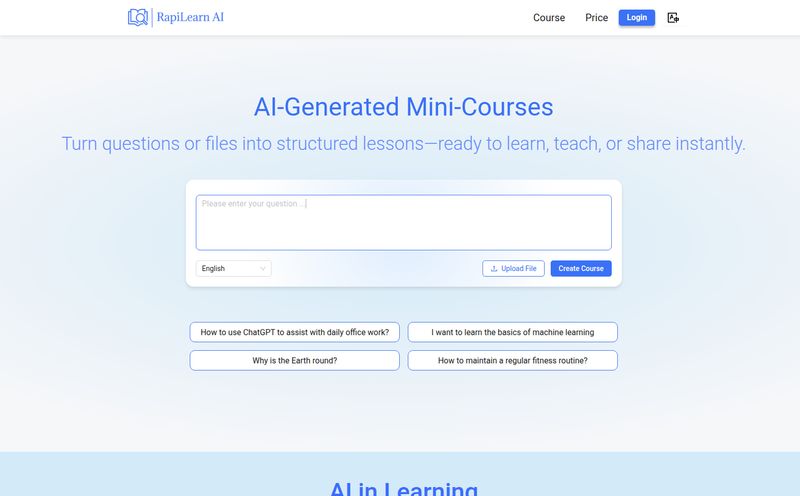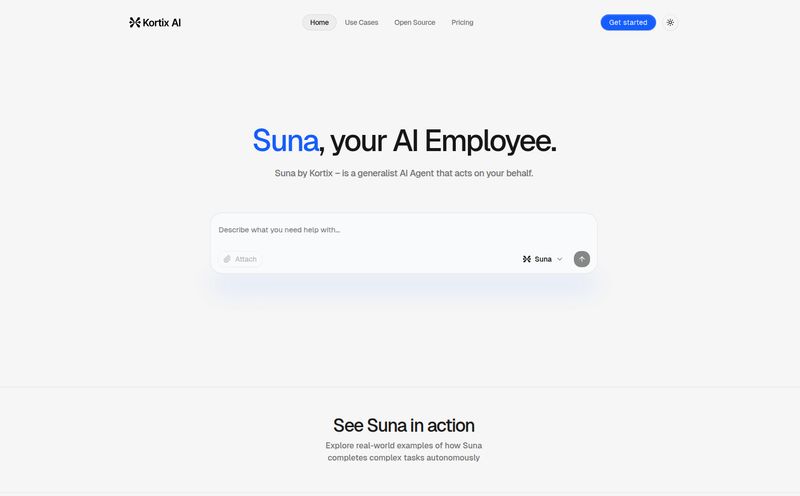Being a caregiver is… a lot. It’s not just the big, obvious stuff. It’s the million tiny tasks that are completely invisible to everyone else. The late-night Googling of a new symptom. The endless phone calls to sort out insurance. The mental gymnastics of tracking medications and appointments. It's a weight. A constant, low-humming stress that can lead to some serious burnout. I've seen it firsthand with friends and family, and man, it's tough.
For years, we've just accepted this as the reality. You put on a brave face, you power through, and you secretly wish for a clone or at least a personal assistant who understands what a “prior authorization” is. So when a tool called The Primary Caregiver popped up on my radar, claiming to be an “AI-powered toolbox” for this exact problem, my curiosity was piqued. An AI for caregivers? It sounds like something out of a sci-fi movie, but also… maybe exactly what the doctor ordered. Let's get into it.
What Exactly is The Primary Caregiver?
Okay, so stripping away the marketing jargon, The Primary Caregiver is essentially a specialized AI assistant designed for the unique chaos of caregiving. Think of it less like a generic chatbot and more like a Swiss Army knife for your health-related responsibilities. Its whole purpose is to take on some of that “invisible labor” I mentioned—the research, the planning, the financial questions—that can quietly drain your energy.
The platform positions itself as a way to get instant answers, find ways to save a bit of cash, and generally make the mountain of health tasks feel more like a manageable hill. It’s about replacing the frantic, 2 AM “what does this mean?!” search spirals with clear, concise information. It’s a bold promise. In an industry where trust and accuracy are everything, leaning on an AI is a big swing. But if it works, it could be a game-changer for millions.

Visit The Primary Caregiver
The Core Features That Actually Matter
A tool is only as good as what it can actually do for you. So, let’s break down the main features of The Primary Caregiver and what they mean in the real world, not just on a sales page.
Instant Answers When You're in a Bind
You know the moment. Your loved one describes a new pain, or the pharmacist hands you a new medication with a name you can’t pronounce and a list of side effects as long as your arm. Your first instinct is to dive into the black hole of web forums and medical sites, where every headache is a brain tumor. It’s terrifying. This tool aims to be the antidote to that panic. Instead of sifting through conflicting, often scary information, you can ask a direct question and get a synthesized answer. What are common side effects? What questions should I ask the doctor about this? It’s like having a 24/7 research assistant who’s blessedly free of drama and worst-case-scenario bias.
A Tool to Ease the Financial Burden
Let's not pretend caregiving isn't expensive. From prescriptions and co-pays to specialized equipment and lost wages, the costs add up shockingly fast. The Primary Caregiver claims it can help you find ways to save money. Now, the specifics on how it does this are a little vague, but I can see the potential. It might help you compare prescription prices, identify community resources you didn't know existed, or even offer tips for navigating the labyrinth of insurance claims. Even saving a small amount each month can reduce a significant source of stress for families. Every little bit helps, right?
Simplifying the Mountain of Health Tasks
Being a caregiver is like being a project manager for someone's health. You're coordinating with multiple doctors, keeping track of medication schedules, logging symptoms, and managing appointments. It's a full-time administrative job nobody trains you for. The platform is built to simplify this. Imagine having a central place to organize all this info, get reminders for medications, or even get help phrasing an email to a specialist. By streamlining these tasks, the goal is to give you back time and, more importantly, mental bandwidth. Time you can spend just being with your loved one, not being their administrator.
My Honest Take on The Primary Caregiver
Alright, let’s get down to the nitty-gritty. I've been around the block with SaaS tools and AI platforms. Some are revolutionary, others are just hype. Here's where I think The Primary Caregiver lands.
The Good Stuff
What I really appreciate about this concept is the focus on empowerment. Caregiving can make you feel helpless and isolated. Having a tool that gives you clear information and actionable steps can restore a sense of control. It’s about going from feeling reactive to proactive. The reduction in guesswork is huge. It helps you walk into a doctor's appointment with smarter questions and a better understanding of the situation. That confidence is priceless. It's not just about managing tasks; it's about managing the emotional toll, and that's a perspective I can really get behind.
Where It Could Be Better
Now, let's be real. Leaning on AI for health information comes with some big caveats. First, this is not, and should never be, a replacement for a doctor. Period. An AI doesn't have the context, the empathy, or the diagnostic skill of a trained medical professional. The effectiveness of the tool is completely dependent on the quality and accuracy of the AI's data. A wrong answer or an incomplete suggestion could be problematic. It's a fantastic starting point for research or for organizing your thoughts, but you absolutely must treat it as a supplementary tool. Think of it as a smart assistant, not the boss. You’re still the primary caregiver, and the final call always rests with you and the healthcare team.
Who is This Tool Really For?
So who should be looking at this? I think it’s particularly useful for a few groups. If you're new to caregiving and feel like you've been dropped into the deep end without a life jacket, this could be your floatie. It can help you get your bearings. I also see it being a huge help for those managing a loved one’s chronic condition, where the day-to-day grind of tracking and managing is relentless. And for long-distance caregivers trying to stay organized and informed from afar? This could be an incredible organizational asset.
Ultimately, it’s for anyone who feels the weight of that invisible labor and wishes they just had a little bit of backup.
The Million-Dollar Question: What's the Price?
Here's the rub. At the time of writing this, the pricing for The Primary Caregiver isn't publicly listed. It's a classic new-tech-platform move. This could mean a few things. They might be in a beta phase, still figuring out their pricing tiers. They could be planning a freemium model, with basic features for free and premium tools behind a paywall. Or it might be a straightforward monthly subscription.
Given that one of its main selling points is saving users money, the price point will have to be pretty reasonable to make sense. My gut tells me we'll likely see a subscription model emerge, probably somewhere in the range of other productivity or wellness apps. I'll definitely keep an eye on this and update when the information becomes available.
Frequently Asked Questions
- Is The Primary Caregiver a substitute for professional medical advice?
- Absolutely not. It's designed to be a supportive tool to help you organize information and ask better questions. Always consult with a qualified doctor or healthcare provider for any medical advice, diagnosis, or treatment.
- How does the tool help save money on caregiving?
- It aims to identify cost-saving opportunities by providing information on things like lower-cost medication alternatives, community support programs, or tips for navigating insurance. The specific methods may vary, but the goal is to highlight potential savings you might otherwise miss.
- Can I trust the information the AI provides?
- You should treat the information as a well-organized starting point. While the AI is designed to pull from reliable sources, it's not infallible. Use it to inform your questions and research, but always verify critical information with a healthcare professional.
- Who can benefit most from The Primary Caregiver?
- Anyone feeling the stress of caregiving responsibilities could find it useful. It's especially helpful for those new to the role, managing long-term chronic illnesses, or trying to coordinate care from a distance.
- Is my personal health data safe with this platform?
- Any reputable health-related platform should have a strict privacy policy that complies with regulations like HIPAA. Before signing up, I'd strongly suggest reading their Privacy Policy and Terms of Service to understand how your data is stored, used, and protected.
A Final Thought
The journey of a caregiver is one of immense love, sacrifice, and often, profound stress. It’s a role that society depends on but rarely supports properly. While no app can replace a human touch or a compassionate ear, tools like The Primary Caregiver represent a step in the right direction. By using technology to absorb some of the relentless administrative and emotional burden, it has the potential to give caregivers something incredibly precious: a moment to breathe. And in the world of caregiving, a single moment of peace can make all the difference.
Reference and Sources
- Caregiver Statistics: Demographics - Family Caregiver Alliance
- AARP Family Caregiving Resources - AARP
- The Unseen Stressors for Working Caregivers - Harvard Business Review



